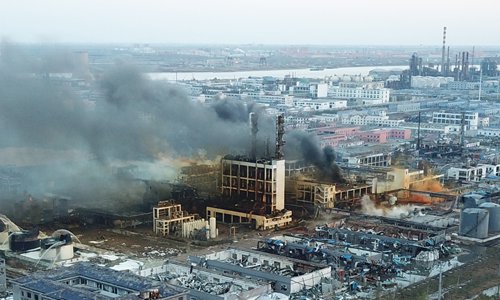
Smoke is seen billowing from an industrial park in Xiangshui county, East China's Jiangsu Province on Friday, 16 hours after an explosion at a chemical factory. Photo: IC
Five days after the deadly explosion in a chemical plant in Xiangshui county, East China's Jiangsu Province, government bodies began to prioritize environmental cleanup as water on the site remains contaminated.
The explosion has killed 78 people so far, Cao Lubao, mayor of Yancheng, which administrates Xiangshui, said at a press conference on Monday, the Xinhua News Agency reported.
Cleanup work has started following a search and rescue operation covering 20 companies located in a 2-square-kilometer area around the blast site, Cao said.
Three people originally listed as missing were found to be safe, Cao said.
Data collected on Monday morning showed that concentration of harmful chemical materials such as benzene homologs and derivates in the air have all dropped to below national limit at monitoring points near the blast site.
A report of monitoring results at six points between 50 to 3,500 meters away from the blast site was released by the Yancheng government on its official WeChat account.
The report said that concentration of benzene was 0.005 milligram per cubic meter at a point 1,000 meters away from the site.
The national standard for toluene concentration is 0.20 milligram per cubic meter, according to a national standard released in 2002.
The air condition has now reached the standard and has stabilized, China Central Television (CCTV) reported on Monday.
However, water bodies within the blast site remain contaminated, with ammonia nitrogen seriously exceeding the standard value, CCTV reported.
Zhao Zhangyuan, a research fellow at the Chinese Research Academy of Environmental Sciences, told the Global Times on Monday that although the air quality is already up to the standard, chemical concentrations are still higher than normal.
Zhao called for further efforts to clean the air, as natural dispersion could take long.
Dams are being constructed around the site to isolate contaminated water and prevent it from leaking out in case it rains, the CCTV report said, noting that experts are working on a plan to deal with the contaminated water in core areas as fast as possible.
Meanwhile, 10 schools affected by the blast resumed classes on Monday morning and the first class in every school offered psychological counseling to students.
Xiangshui authorities have arranged numerous psychological experts for students and teachers, who are terrified by the unexpected tragedy.
Psychological experts are also providing counseling to firefighters and rescuers, the youngest among whom are 17-18 years old, according to Lu Jun, the chief of staff for the Jiangsu provincial fire and rescue team and vice general director of rescue work in Xiangshui.
It is the first time for these young people to go through such a massive tragedy and see dead bodies, and they possibly cannot handle it on their own, Lu explained.
After the blast, the State Council Work Safety Committee asked all related authorities, departments and companies nationwide to start an all-out examination of hidden dangers of hazardous chemicals, reads a statement of China's Ministry of Emergency Management released on its WeChat account on Monday.

